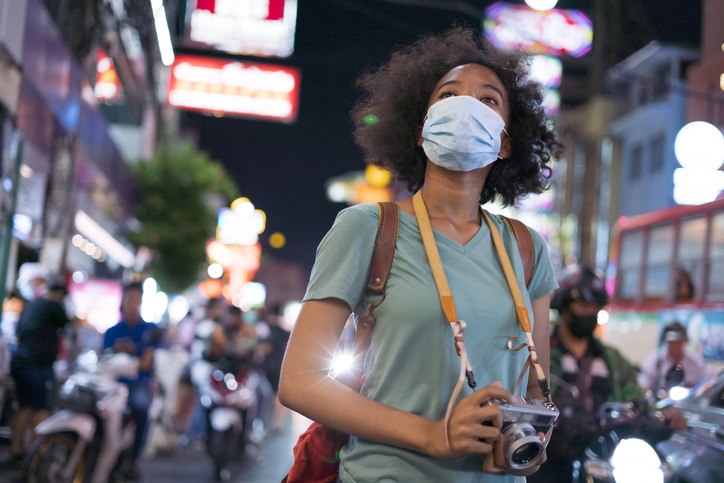Reading time: 5 minutes

It's time to get excited! At long last, we can dare to make travel plans and jet off to lands that have been off limits. Living with Covid means different things in different countries, however, and it pays to think this through before deciding on where to go and what you'll do when you get there.
Should I travel to countries with low vaccination rates?
Vaccine inequity is real, and while Australians have had relatively easy access to vaccines and booster shots if they want them, some countries haven't been so lucky. Less well-off nations have been dealing with low supplies and logistical issues in the manufacture, transportation and administration of vaccines, and many are grappling to give their populations even a first dose.
Globally, 62 per cent of people have received at least one dose of a COVID-19 vaccine. Some, such as the UAE, Canada, Portugal, Singapore and Australia are celebrating high percentages of their populations being vaccinated but others are battling to reach double figures. In Ethiopia and Nigeria, less than 10 per cent of people have had even one dose of the vaccine.
So, while you may be fully vaccinated, the people you encounter on your travels in low- and middle-income economies may not be. As we know, even full vaccination doesn't mean you won't get COVID and you may not even know you have it. Pass it on to someone who's unvaccinated or vulnerable and the consequences could be dire.
Bottom line? Avoid travelling to countries with low vaccination rates for now. Efforts are underway around the world to improve vaccine access – campaigns such as the WHO Foundation's Go Give One and UNICEF's Give the World a Shot among them – so plan to delay visiting rather than crossing destinations off your list forever. When a country's population reaches a double vaccination rate of at least 70 per cent, it's the right time to pack your bags and go.
How can I protect myself and others when I travel?
No matter where you're travelling, there are precautions you can take to stay safe and protect the people around you. Make sure your vaccinations are as up to date as they can be (boosters and all), and wear an effective mask in airports, on public transport and anywhere crowds congregate or ventilation is poor.
Follow any mandates a destination has in place, and keep up to speed via local news sites to track any changes to COVID-related rules and regulations during your stay.
If you're going out to eat, choose the outdoor dining option if you can or opt for take-away and a picnic if local COVID transmission rates are high. Washing your hands before you eat and sanitising at every opportunity is something we're well used to, but keeping it up when you travel is a smart safety measure to take.
If you're heading off on a resort-style holiday, but vaccination rates are lagging in the local population, consider whether it's necessary to leave the resort during your stay. Cocktails by the pool, watersports and spa treatments are all pretty good reasons not to stray from the resort, and you'll be placing fewer local people at risk in the process. Resort staff are more likely than most to have been vaccinated, but the same may not be true for taxi drivers, people working in markets, and other locals out in the community. If you do want to get out and about, consider going on a tour affiliated with the resort and choose one that gets you out into nature rather than into crowds.
City getaways are another story – exploring the hustle and bustle of urban life is part of the fun. If you do feel any COVID or cold-like symptoms, though, be sure to take a Rapid Antigen Test (pack a few in your luggage before you go) and isolate until you feel better and test negative. It's a bummer, but it's the right thing to do.
If you're still deciding on where to holiday next, consider what would happen if you did get COVID and needed hospital treatment. Does the destination you're considering have the infrastructure in place to cope with a COVID outbreak? COVID isn't over yet, so having access to a high standard of medical care if you need it should be an important consideration.
Travel insurance and Coronavirus (COVID-19)
Cover for some Coronavirus related events is available on all our plans, but the level of benefits vary between them. This means you should take the time to compare plans and benefit levels against your planned travel.
As much as we'd love to cover every Coronavirus-related scenario that a traveller can think of, that's not what travel insurance is designed to do, so read the PDS carefully to know what is, and isn't, covered.
- Overseas Medical Benefit: If you get sick with Coronavirus while on your journey, Travel Insurance Direct's plans (excluding Domestic) include cover for medical expenses incurred overseas;
- Coronavirus travel costs: Our Coronavirus travel costs benefit is available on The Works, Annual Multi Trip, and Domestic plans, and it offers cover for several Coronavirus related events, some of which include cover for quarantine expenses and trip cancellation.
This is a brief summary of cover only and does not include the full terms, conditions, limitations and exclusions. Read the PDS before purchasing.